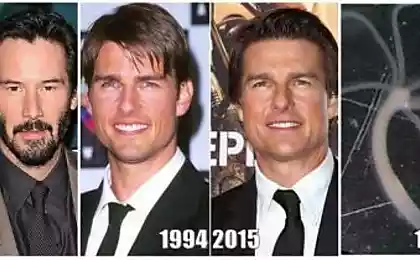573
Fragile minds: do we become smarter with age
Modern medical technology can significantly postpone aging. Older people look better, have more sport and lead more active lifestyles. But do they think at the same speed? And when is the peak mental acuity is 20, 30, 40 or maybe later? In a blog on Huffington Post neuroscientist Sandra bond Chapman talks about how the brain changes with age, and why it's not always a bad thing.

© Hanna Lenz
In our society, with its cult of youth the stereotype that the process of brain aging is the inevitable, progressive decline. This myth causes most people to believe that their best years are behind us. Think about it. When your brain was working at peak capacity? I often ask people this question and hear the answer "10 or 20 years ago," regardless of how old a person is.
While it is true that the speed of many processes in the brain decreases with age, but it is only part of the truth. Studying this topic we found out that we have more reasons to rejoice than to fear. Some brain capacity only improved with age. A new study conducted under the leadership of Joshua Hartshorne at mit, shows us peaks mental processes at different ages. For example, the study revealed that the names, dates and places we best remember in high school, but speed of memory decreases rapidly to 18 years. The amount of information that we can learn and use at any time, called working memory, operates best in the middle of the second decade. But other abilities such as emotional intelligence and vocabulary, culminating decades later.
According to The Wall Street Journal, the study Hartshorn analyzes various brain processes as an integral part of intelligence, instead of traditionally to treat them as a single unit. In the Center of brain health at the University of Texas at Dallas is also considered important to examine cognitive health and aging in a broader perspective.
A few years ago, our team from the Center for brain health one of the first in the history have begun to study the relations between age, cognitive health and ability to make decisions. Previous studies have confirmed the decrease with age of the ability to think logically and solve problems. But they had a serious fault: they ignored the positive age-related factors — such as a big life experience, the ability to comprehend the information and accumulated knowledge that may preserve and even increase the speed and efficiency of decision-making.
The time has come to reframe negative ideas about the aging brain and follow a more positive view of the world.
In our study, we tested healthy adults fifty, sixty and seventy years. Fortunately, we found no decline in the ability to make decisions in either group. But found that strategic learning ability — that is, the ability to analyze and prioritize information, and unnecessary to ignore — increases with age.
In addition, the older members of the groups coped with some tasks even better than young. They were more conscientious, were far-sighted when considering the different options before making a decision and were less focused on immediate and rapid decision-making without taking into account the speed of other group members.
This study demonstrates that the brain can compensate for the reduced speed of decision making and the ability to remember facts and to improve other functions. One of the most valuable qualities of the aging brain — deep storage of the obtained information and experience and the ability to efficiently extract and make abstract big ideas than details. This is one reason why CEOs are more likely to be people fifty, sixty years old (and even older), not twenty. 25-year-old employee may be able to take in and remember more information, but worse understands what information is important and what is less important for the considered solutions.
If you are one of those people who believes that from the point of view of the brain work their best years behind, ask yourself the following: could you do the work which is performed today and assume the same responsibility twenty years ago? Probably not. What you are missing because of lack of speed and ability to remember new things, you should be able to fill the knowledge, experience and wisdom. But it will not happen by itself: it is necessary to train your brain to maintain it in great shape. Another plus aging of the brain: research shows that older people are less fixated on negative information, on the contrary, they are much more willing to remember the good. This ability to keep a positive attitude is a big plus for social relations.
In fact, the above study shows that the characteristic of our brain neuroplasticity can be used to improve mental performance and cognitive health. So, presumably, can never be too late to save or even improve the performance of our brain.
The time has come to reframe negative ideas about the aging brain and follow a more positive view of the world. Aging is not a disease. For most elderly people who have not developed Alzheimer's disease or other dementia, aging is just a new development process that could improve cognitive abilities. If you continue to stay mentally active, forcing yourself to think more deeply, avoiding the constant distractions of attention and information overload, learning new information and gaining new skills, it is likely that the best years for your brain ahead.published
P. S. And remember, only by changing their consumption — together we change the world! ©
Join us in Facebook and in Vkontakte, and we're Classmates
Source: theoryandpractice.ru

© Hanna Lenz
In our society, with its cult of youth the stereotype that the process of brain aging is the inevitable, progressive decline. This myth causes most people to believe that their best years are behind us. Think about it. When your brain was working at peak capacity? I often ask people this question and hear the answer "10 or 20 years ago," regardless of how old a person is.
While it is true that the speed of many processes in the brain decreases with age, but it is only part of the truth. Studying this topic we found out that we have more reasons to rejoice than to fear. Some brain capacity only improved with age. A new study conducted under the leadership of Joshua Hartshorne at mit, shows us peaks mental processes at different ages. For example, the study revealed that the names, dates and places we best remember in high school, but speed of memory decreases rapidly to 18 years. The amount of information that we can learn and use at any time, called working memory, operates best in the middle of the second decade. But other abilities such as emotional intelligence and vocabulary, culminating decades later.
According to The Wall Street Journal, the study Hartshorn analyzes various brain processes as an integral part of intelligence, instead of traditionally to treat them as a single unit. In the Center of brain health at the University of Texas at Dallas is also considered important to examine cognitive health and aging in a broader perspective.
A few years ago, our team from the Center for brain health one of the first in the history have begun to study the relations between age, cognitive health and ability to make decisions. Previous studies have confirmed the decrease with age of the ability to think logically and solve problems. But they had a serious fault: they ignored the positive age-related factors — such as a big life experience, the ability to comprehend the information and accumulated knowledge that may preserve and even increase the speed and efficiency of decision-making.
The time has come to reframe negative ideas about the aging brain and follow a more positive view of the world.
In our study, we tested healthy adults fifty, sixty and seventy years. Fortunately, we found no decline in the ability to make decisions in either group. But found that strategic learning ability — that is, the ability to analyze and prioritize information, and unnecessary to ignore — increases with age.
In addition, the older members of the groups coped with some tasks even better than young. They were more conscientious, were far-sighted when considering the different options before making a decision and were less focused on immediate and rapid decision-making without taking into account the speed of other group members.
This study demonstrates that the brain can compensate for the reduced speed of decision making and the ability to remember facts and to improve other functions. One of the most valuable qualities of the aging brain — deep storage of the obtained information and experience and the ability to efficiently extract and make abstract big ideas than details. This is one reason why CEOs are more likely to be people fifty, sixty years old (and even older), not twenty. 25-year-old employee may be able to take in and remember more information, but worse understands what information is important and what is less important for the considered solutions.
If you are one of those people who believes that from the point of view of the brain work their best years behind, ask yourself the following: could you do the work which is performed today and assume the same responsibility twenty years ago? Probably not. What you are missing because of lack of speed and ability to remember new things, you should be able to fill the knowledge, experience and wisdom. But it will not happen by itself: it is necessary to train your brain to maintain it in great shape. Another plus aging of the brain: research shows that older people are less fixated on negative information, on the contrary, they are much more willing to remember the good. This ability to keep a positive attitude is a big plus for social relations.
In fact, the above study shows that the characteristic of our brain neuroplasticity can be used to improve mental performance and cognitive health. So, presumably, can never be too late to save or even improve the performance of our brain.
The time has come to reframe negative ideas about the aging brain and follow a more positive view of the world. Aging is not a disease. For most elderly people who have not developed Alzheimer's disease or other dementia, aging is just a new development process that could improve cognitive abilities. If you continue to stay mentally active, forcing yourself to think more deeply, avoiding the constant distractions of attention and information overload, learning new information and gaining new skills, it is likely that the best years for your brain ahead.published
P. S. And remember, only by changing their consumption — together we change the world! ©
Join us in Facebook and in Vkontakte, and we're Classmates
Source: theoryandpractice.ru
The female body: from these standards we have in mind?
The life and predictions of Matrona of Moscow























